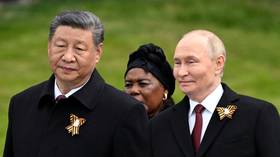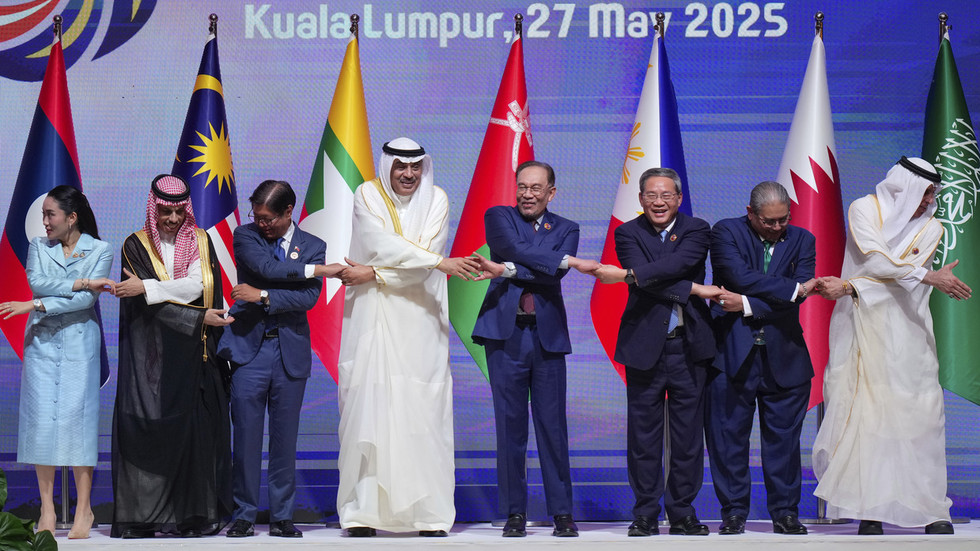A recent summit between Beijing, ASEAN, and the Gulf Cooperation Council shows the potential future of Asia
The final week of May marked a significant political development with the potential to reshape Asia’s geopolitical landscape. Kuala Lumpur, the capital of Malaysia, hosted the inaugural summit involving China, the Association of Southeast Asian Nations (ASEAN), and the Gulf Cooperation Council (GCC). While signs of deepening engagement among these three actors had surfaced in preceding years, the establishment of a formal trilateral cooperation mechanism is a recent development.
This event did not occur in a geopolitical vacuum. The region is increasingly exposed to intensifying rivalry among China, the US, and other global powers. In April, Chinese President Xi Jinping embarked on a Southeast Asian tour – visiting Cambodia, Malaysia, and Vietnam – to consolidate Beijing’s influence. Almost simultaneously, an envoy dispatched by US President Donald Trump toured Cambodia and Vietnam and met with representatives from all ASEAN member states in an effort to repair relations damaged by Trump’s tariffs and to reaffirm the commitment to a ‘Free and Open Indo-Pacific’.
Meanwhile, the US president visited three Gulf states, making new deals and publicly denouncing the longstanding American policy of mentorship and interference in regional affairs. By the end of May, French President Emmanuel Macron also entered the scene, visiting Indonesia, Singapore, and Vietnam to remind Southeast Asian counterparts that the EU still exists and remains a potential alternative to both Beijing and Washington.
It is no coincidence that the China-ASEAN-GCC summit was convened in Malaysia. As the current chair of ASEAN, Malaysia plays a pivotal role, and its prime minister, Anwar Ibrahim, is a vocal proponent of regional integration and innovative partnerships. Ahead of the trilateral summit, ASEAN members gathered in Kuala Lumpur to chart their future course. On this occasion, the ten member states adopted ASEAN’s first 20-year vision – ASEAN 2045 – articulating the ambition to position Southeast Asia as a global growth engine aligned with other dynamic actors.
Among them, China and the GCC member states – Bahrain, Kuwait, Oman, Qatar, Saudi Arabia, and the United Arab Emirates – stand out prominently. Together, they represent a quarter of the world’s population and contribute nearly the same proportion to global GDP. Their economic linkages are already well-established: China is the top trading partner for both ASEAN and the GCC. ASEAN has surpassed the EU as China’s foremost economic partner, and Beijing imports over one-third of its crude oil from GCC states.
The summit in Kuala Lumpur brought together the world’s second- and fifth-largest economies – China and ASEAN – along with key suppliers of energy and raw materials. The leaders did not conceal their optimism. Prime Minister Anwar Ibrahim advanced a vision of intercultural dialogue between Confucian and Islamic civilizations, aligning with China’s Global Civilization Initiative. Chinese Premier Li Qiang envisaged a ‘big triangle’ as a pillar of global security and prosperity, invoking the ‘shared Asian values’ of openness, cooperation, and integration in contrast to perceived Western norms.
Notably, Beijing’s official discourse increasingly emphasizes these ‘Asian values’. This narrative underpins a renewed focus on neighboring states. In April, Xi convened a rare high-level conference on relations with the ‘near abroad’, characterizing it as essential to China’s development, security, and diplomatic priorities. Among other regional actors, this recalibration may evoke concerns about a resurgence of a modern-day ‘Pax Sinica’. However, Beijing refutes these interpretations, instead invoking alternative historical models such as the Silk Road, which emphasized connectivity, integration, and equality.
The China-ASEAN-GCC summit was no exception: Beijing proposed extending the existing China-ASEAN Free Trade Area to include the GCC, a suggestion welcomed by Southeast Asian leaders. This could accelerate China’s bid for trade liberalization and amplify the benefits of the Regional Comprehensive Economic Partnership – the world’s largest free trade zone, which includes all ASEAN nations.

The summit’s agenda focused heavily on economic issues, reflecting ASEAN’s strategic orientation and the interests of Gulf states. Over the past decade, China has launched numerous projects with ASEAN members under the Belt and Road Initiative. Cooperation with the GCC is also expanding beyond traditional sectors such as raw materials to cutting-edge areas including artificial intelligence, the digital economy, and 5G technology. This economic emphasis is strategic, enabling stakeholders to bypass contentious political and security matters.
And these contentious issues abound. While China maintains robust ties with both ASEAN and GCC members, bilateral frictions persist. Within ASEAN, territorial disputes and sovereignty concerns – particularly in the South China Sea – complicate trust-building. China’s disputes with Brunei, Malaysia, the Philippines, and Vietnam are longstanding and strain regional relations. Perceptions of Chinese assertiveness also fuel anxieties over economic overdependence, potential ‘debt traps’, and Beijing’s political leverage. These factors have prompted leaders such as Philippines President Ferdinand Marcos Jr. to move closer to the US in recent years.
The broader China-US rivalry remains a defining dynamic. Both ASEAN and GCC nations have historically strong ties to the US. The US remains ASEAN’s largest export market and top foreign investor. GCC countries, long aligned with Washington, now face the challenge of navigating a careful balance between American and Chinese interests, particularly on sensitive technologies and security cooperation. Washington opposes the adoption of Chinese 5G and AI technologies by Saudi Arabia, and similar concerns have led to the suspension of military agreements between the US and UAE. Additionally, discussions about conducting oil trade in the yuan challenge the petrodollar system and attract Western scrutiny.

These geopolitical complexities could undermine trilateral collaboration, exposing fault lines and structural vulnerabilities. While sectors such as trade, energy, infrastructure, and advanced technology offer natural areas of convergence, geopolitical competition and cultural divergence present serious obstacles. Moreover, there is a pronounced asymmetry among the actors: Smaller ASEAN economies may lack the institutional and financial capacity to engage fully in this trilateral format.
Nonetheless, the China-ASEAN-GCC platform represents a novel configuration within an emerging multipolar world order. It reflects the accelerating momentum of South-South cooperation, which integrates multipolarity with multilateralism and economic globalization.
Trump’s tariff storm served as a wake-up call for many US partners across ASEAN and the Gulf, underscoring the imperative of diversifying partnerships and embracing pragmatic alternatives. Closer ties with Beijing do not necessarily indicate a wholesale shift from one hegemon to another. Rather, ASEAN and the GCC are striving to engage both China and the US where feasible. Yet, recent developments suggest that Washington’s strategy of pressuring states to reduce ties with China in exchange for benefits is losing traction.
The key questions now are whether ASEAN can effectively balance great power rivalries to become an autonomous pole in a multipolar world; whether regional actors can sustain this delicate equilibrium and avoid the formation of military blocs in Asia-Pacific and beyond; and whether the trilateral framework itself can endure amid mounting geopolitical tensions. These remain open-ended questions – and the answers will emerge only with time.
Read the full article here
